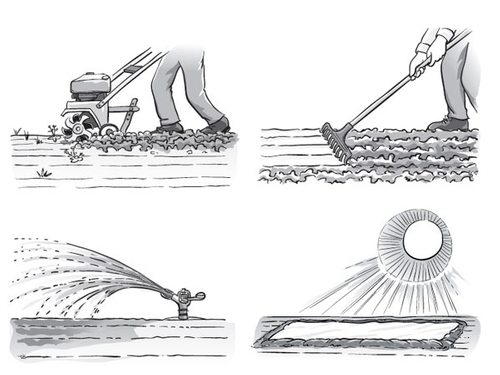- Author: Pamela M. Geisel
One of the biggest challenges to growing a vegetable garden in a non-raisedbed situation can be the weeds. The can make the garden unsightly, compete with the vegetable plants you really want and make you feel overwhelmed in trying to manage them. Here is your five step plan to a better garden with fewer weeds:
Step one: Control existing weeds. If your garden has any weeds, you first need to take care of them prior to doing anything (except planning). You have a couple of options. You may rototill your garden to dig under existing weeds or you can spray out the garden with a non-selective herbicide such as glyphosate (Round-up). You should do this well before you plan to plant. This will only control the weeds that are there now and you will have more weeds germinate as the temperatures begin to warm up and water is applied. You may have to either manually take out any newly germinated weeds or spray just prior to planting. Take care not to bring weed seeds up from lower soil layers by tilling too deeply.

Step three: Layout your irrigation system and plant. Once your soil has been solarized you can layout your irrigation system. Remember, wherever water is applied, that is where weeds will grow. If you irrigate using a drip system, you can really reduce the number of weeds overall in your garden. Once the irrigation system is in place and you have past the last frost date or planned for cold protection you can plant. For ideas of what to plant when, go to our handy guide at: http://ucanr.org/sites/gardenweb/files/29040.pdf
Step four: Mulch. One great tool to reduce weed problem is to use a mulch material over the planting beds
Step five: Grow a healthy garden. A healthy, vigorous garden will be very competitive with any weeds that do germinate. For information on how to do that, go to a PDF on Vegetable Garden Basics at: http://anrcatalog.ucdavis.edu/pdf/8059.pdf



I suspect your weed problems are not directly related to the brick vs wood planters - that's probably coincidental timing more than anything. If you are using the black plastic in an effort to heat the soil (eg solarization) you might want to read the UCIPM publication "Soil Solarization for Garden and Landscape (http://ipm.ucanr.edu/PMG/PESTNOTES/pn74145.html) - there is good information there about clear plastic vs black plastic as well as ways to maximize performance. There is also a UCIPM publication focused on Creeping Woodsorrel and Bermuda Buttercup that may help with your problem too (http://ipm.ucanr.edu/PMG/PESTNOTES/pn7444.html.
Good luck
Brad
Most of the weed&feed type products are actually foliar herbicides (2,4-D, dicamba, mecoprop, etc). The way they "mostly" work is you wet the leaves (lawn, generally) and then spread the granuals which stick to the wet leaves long enough for some herbicide to transfer into the plant. It will still happen to a degree on non-wetted leaves, especially if you are in a humid environment, though.
So that has a good-news/bad-news aspect. Bad-news: there's a good chance foliar uptake has occurred and the damage may be in process. On the other hand, if the herbicide granules are on the soil and not on the leaves uptake of these herbicides from soil is relatively low. But, some more bad news: some veggie garden plants are pretty sensitive to growth regulator herbicides like 2,4-D and dicamba (your tomatoes probably are the most sensitive.
If you can still see the granule on the surface, you could try sweeping them off area (I'd dispose in the lawn, which is a typical application). Do this before you water. I'd try this before I replanted (you'll know within a week of watering if you're going to see serious injury).
If you elect to replant, you wouldn't need to remove a lot of soil, maybe just the surface 1/4 inch or so if the herbicide has not been watered in. If you do that, I'd first transplant a few tomatoes as "bioassay" plants to see if their growth is malformed before replanting the rest.
good luck!
Brad
Pics of rows, (link removed by editor)
If deer put holes in your solarization plastic, I'd suggest pulling the weeds you can and then sealing the holes with duct tape. However, the idea of solarization is to create a greenhouse effect where light penetrates and then heat is retained - red plastic is likely to be significantly less effective for this than clear plastic. But whether for heat retention or simply physically blocking weeds, taping the holes shut will be better than leaving them open.
There's a nice (older) publication from UC on solarization if you search for UC publication 21377 ("Soil Solarization: a nonpesticidal method for control diseases, nematodes, and weeds") if you're interested.
Good luck,
Brad